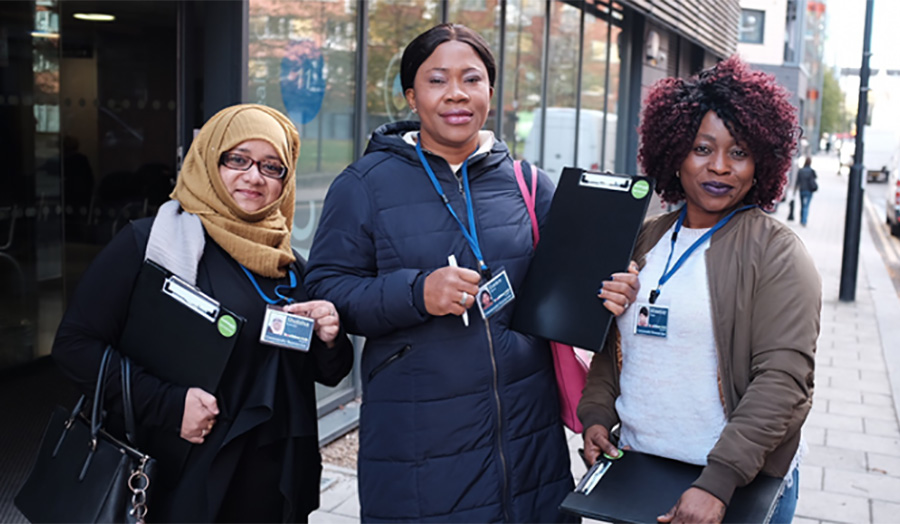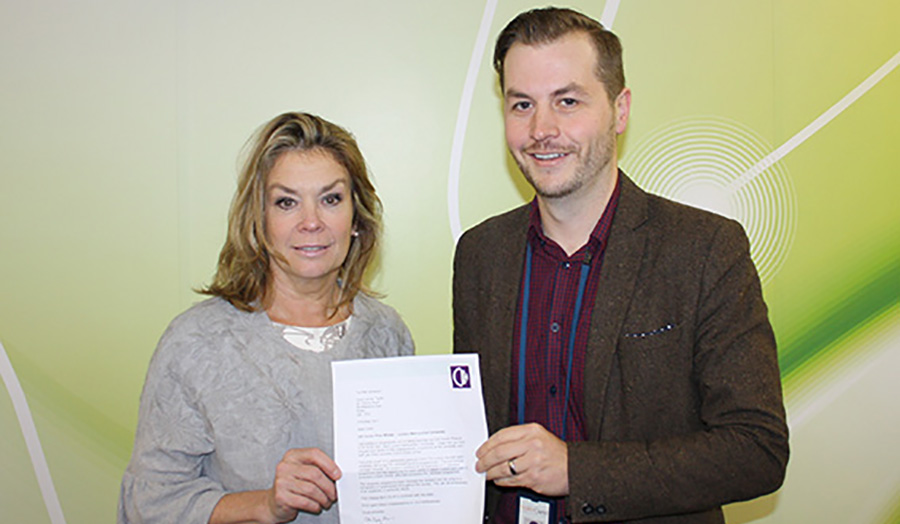Apply for this course
Please select when you would like to start:
If you're a UK applicant wanting to study full-time starting in September, you must apply via UCAS unless otherwise specified. If you're an international applicant wanting to study full-time, you can choose to apply via UCAS or directly to the University.
If you're applying for part-time study, you should apply directly to the University. If you require a Student visa, please be aware that you will not be able to study as a part-time student at undergraduate level.
If you're applying for a degree starting in January/February, you can apply directly to the University.
Apply to us for September 2025
If you're a UK student or an EU student with settled or pre-settled status applying for September 2025, you can simply call our hotline on 0800 032 4441 or complete our fast-track online application form.
Why study this course?
Our Health and Social Care BSc (Hons) degree course is designed to help you develop the confidence, knowledge and skills required for a professional career in the health and social care sector. The programme is aligned to the standards specified by Skills for Health (the Skills Council for the NHS) and on completion of the course you’ll be able to demonstrate to prospective employers that your advanced skills conform to the National Occupational Standards (NOS).
Our Health and Social Care course is also fully validated by the Chartered Institute of Housing (CIH), so if you choose to specialise in housing you'll receive free student membership of the CIH.
Fully validated by the CIH
Our Health and Social Care course is also fully validated by the Chartered Institute of Housing (CIH), so if you choose to specialise in housing you'll receive free student membership of the CIH
Study health and social care in a modern context
This course is informed by current and expected changes in the UK healthcare sector, including advances in healthcare technology, quality concerns and the rising cost of providing care
Third in London for student satisfaction
Our social work courses are ranked third in London for overall student satisfaction in the Complete University Guide 2025
Course modules
The modules listed below are for the academic year 2025/26 and represent the course modules at this time. Modules and module details (including, but not limited to, location and time) are subject to change over time.
Year* 1 modules
Year 2 modules
Year 3 modules
Diversity in Health & Social Care
This module currently runs:all year (September start) - Friday afternoon
all year (January start) - Monday afternoon
(core, 30 credits)
On this module you will study theories and concepts of diversity, equality, equity, and inclusion within health and social care practice, fostering both a theoretical understanding and practical application of these principles. These will be achieved through lectures, seminars and case study simulations and critical reflections, which help bridge the gap between theory and practice. These activities will enable you to explore how your learning translates to real world settings and shapes your approach to working with diverse individuals in health and social care contexts. You will critically engage with relevant policies legislations, codes of practice and professional frameworks relating to issues of social justice in health and social care. Additionally, you will examine professional roles and skills including communication, teamwork and integrated care essential in challenging inequalities and implementing ethical, anti-discriminatory, and anti-oppressive practice. By examining diverse identities and experiences shaped by class, race, culture, gender, religion, language, sexual orientation, age and disability, you will develop a reflective understanding of the challenges individuals face in accessing and experiencing care. This exploration will also focus on approaches to supporting individuals effectively and working inclusively with people from diverse backgrounds. You will be provided with opportunities to reflect on your own identity, lived experiences and personal and professional aspirations, and will be encouraged to keep a reflective journal of your learning throughout the module.
This module aims to:
- Introduce policies, legislations, professional frameworks and codes of practice relevant to promoting diversity, equality and ethical practice in health and social care
- Explore concepts of equality, equity, inclusion and diverse identities while addressing stigmatisation, labelling, stereotyping and discrimination
- Develop student’s self-awareness and reflective skills to understand how their identities, experiences and values can impact their practice
- Equip students with the tools to implement anti-oppressive and person centred approaches while addressing inequalities in health and social care
- Build academic and professional skills, including critical thinking, communication and reflective practice to support lifelong learning and career development.
Human Growth & Development
This module currently runs:all year (September start) - Thursday afternoon
all year (January start) - Tuesday afternoon
(core, 30 credits)
In this module, you will study human growth and development across the life stages. You will examine in depth the different stages of the human lifecycle, from birth to death, and how this understanding relates to effective practice in health and social care. You will explore human development from multiple perspectives, and apply diverse physical, cognitive, psychological and sociological theories to this exploration. You will also examine the life stages through a cultural lens, and critique normative expectations regarding physical, psychological and social development. You will develop and share your understanding of issues such as the nature versus nurture debate, the role of genes in human growth and development, identity across the life stages and the conflicts faced when developmental norms are challenged. Central to these issues will be their application to practice, which you will be encouraged to critically analyse in depth through case studies based on real life practical examples, from both a local and global perspective. You will also be encouraged to reflect on your own lifecycle development, and how your experiences and the social, psychological and wider environmental factors that have shaped these, such as structural inequalities in society, have impacted your values, identity, personal and professional skills, and aspirations. This reflective process also supports the development of professional skills, including critical thinking, communication, and self-awareness, which are central to Personal and Professional Development (PPD). You will explore challenges facing diverse people across the life stages, how these impact development, and approaches that are used to facilitate positive development based on research and theory. You will learn how this understanding relates to current concepts in health and social care such as co-production, person centred care and strength-based approaches. You will demonstrate this understanding through active discussion, interactive groupwork, and authentic assessment.
Introduction to Health & Social Care
This module currently runs:all year (September start) - Monday morning
all year (January start) - Friday morning
(core, 30 credits)
This module offers a foundational understanding of the structure, regulations, policies, organisation, and delivery of health and social care systems and services. You will explore the roles and responsibilities of professionals within the system and examine how services are coordinated to meet the needs of diverse populations. You will be encouraged to analyse specific health and social care issues. By examining real-world scenarios, students will develop a nuanced understanding of the factors that contribute to health inequalities, including social determinants such as education, employment, and housing.
A key focus of the module is the practical application of health and social care policies. Using case studies, you will analyse how policies influence service provision, workforce planning, and population health outcomes. You will also explore the impact of social determinants of health, including education, employment, and housing, and how these contribute to health inequalities.
By the end of this module, you will be well-equipped with the basic knowledge and skills necessary to navigate and contribute effectively to the health and social care sector.
Read full detailsResearch & Academic Practice
This module currently runs:all year (September start) - Thursday morning
all year (January start) - Tuesday morning
(core, 30 credits)
This module introduces you to key research concepts and academic practice within health and social care context. We will cover academic skills crucial for producing quality academic work in various formats, including writing, presenting and designing outputs. The emphasis is placed on you developing key academic and digital skills, such as using Microsoft Office tools, podcasting, video recordings, poster design, to engage with research, critically evaluate evidence and effectively present and communicate your academic work . You will be introduced to the core principles of research, including understanding sources of evidence and theoretical frameworks and research approaches. These research and academic skills are embedded throughout the module via lectures, seminars, and assessments. You will also be introduced to the final year project pathway to begin considering the pathway you wish to pursue and potential topics as you engage with content across other modules.
This module aims to:
Develop student’s academic study skills and digital literacy.
Introduce students to research within the health and social care context and how to find academic and non-academic sources
Develop students’ ability to reason critically and analytically from evidence
Make connections between work based and academic knowledge, evaluating and appropriately using different sources (academic and non-academic)
Consider the academic and professional skills required within health and social care including communication, teamwork, partnership working and ethical research and academic practice
Explore ethical and unethical use of AI in academic work and H&SC contexts, with reference to London Metropolitan University guidance, responsible digital practice and academic integrity.
Develop an awareness and understanding of the cultures, principles and values that underpin research within health and social care
Read full detailsLeadership in Health & Social Care
(core, 15 credits)No module details available
Preparing for Practice
(core, 30 credits)No module details available
Researching Health & Social Care
(core, 30 credits)No module details available
Social Policy & Society
(core, 15 credits)No module details available
Understanding Public Health
(core, 30 credits)No module details available
Contemporary Approaches to Health & Social Care
(core, 30 credits)No module details available
Health Project
(core, 60 credits)No module details available
Global Health
This module currently runs:spring semester - Thursday morning
(option, 15 credits)
Global Health is a Level 6 module for the BSc Health and Social Care Course. The Module aims to give students an opportunity to critically study the interconnectedness of key challenges of human development and human health and healthcare across nations within global contexts. It will provide content that will help students understand the key global challenges that affect human health and healthcare and cause health inequalities and inequities across the nations. The Module will also provide an opportunity to study key global actors and global interventions to improve human health of all people across nations and promote health equities. This will require students to critique global co-operation and partnership in fighting key challenges of global human health and healthcare.
Therefore, the Module aims are to:
• develop and produce graduates with global citizenship attributes by embedding the notion of ‘think globally and act locally’ (‘think globally for local actions’) in its curriculum
• develop a critical knowledge base of concepts, principles, measurements and theories of global health and healthcare based on the notion of ‘global health crisis’
• build a critical understanding of the key challenges of the growing global interconnectedness on global human health and healthcare
• identify and critique the determinants and evidence of global health inequalities and inequities
• examine the influence and contribution of health systems in improving human health around the world
• consider complexities in solving global health and healthcare problems found in past and contemporary case-studies and draw implications from them for future research, policy and practice in global health
Managing Health & Social Care
(option, 15 credits)No module details available
Mental health & well being
This module currently runs:autumn semester - Thursday morning
(option, 15 credits)
This module provides opportunities for students to develop their understanding of key issues in mental health practice and policy, as well as critically discuss relevant theoretical and conceptual issues relating to mental health.
The module aims to:
- Develop understanding of key concepts in mental health and well-being
- Develop awareness of mental health diagnoses and implications of these to the individual, health services, and wider society
- Develop knowledge of key policy and practice issues in mental health through
- Provide opportunities to critically evaluate and reflect upon models and theories of mental health and well-being
Public Health & Health Promotion
(option, 15 credits)No module details available


.jpg)










